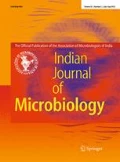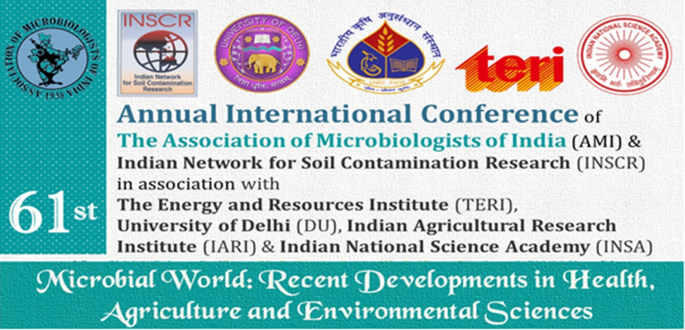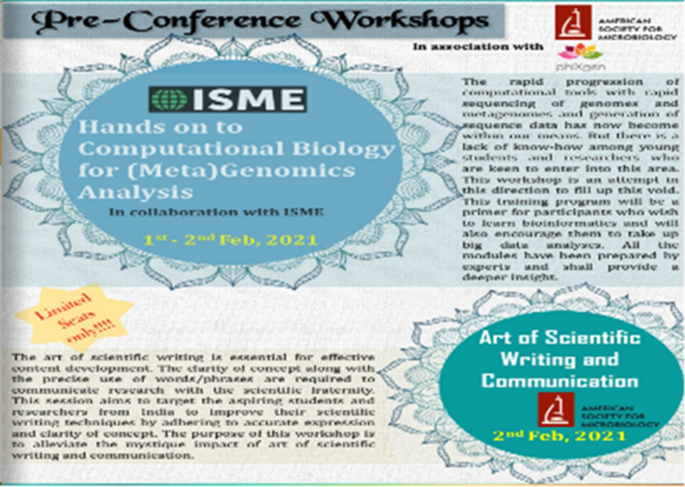Microbial World: Recent Developments
For the past 60 years, the Association of Microbiologists of India (AMI) has been bringing research scientists, scholars, academicians and students, working in microbiology and its allied sciences, to present their research and share new ideas on a common platform during its annual conference. Due to the unprecedented situation of coronavirus disease 2019 (COVID-19), the entire world came to a standstill in the beginning of 2020. Everything including normal life of individuals to countries’ economies to the exchange of knowledge, following the closure of universities, research centers and laboratories and the whole educational system collapsed during the lockdown period not only in India but across the globe. Most of the scheduled scientific events were either cancelled or postponed. This, however, did not hinder the academic global fraternity to interacting or collaborating with each other and the deliberations thus shifted online. In the league, the 61st annual international conference of AMI was held, for the first time, in a complete online mode. The AMI conference was held in association with the Indian Network for Soil Contamination Research (INSCR) from 3rd to 5th February, 2021. The conference was jointly organized by The Energy and Resources Institute (TERI), New Delhi; Department of Zoology, University of Delhi (UoD), Delhi; and the Indian Agricultural Research Institute (ICAR-IARI), New Delhi (http://www.ami.inscr.co.in/) (Fig. 1).
It was a novel and enriching experience for all participants and organizers of AMI/INSCR to shift from offline to online mode for conducting the annual conference.
Association of Microbiologists of India (AMI) Conferences
The AMI was established in 1938 and is one of the India’s oldest scientific organizations. Since its inception, it has made significant contributions to the advancement of microbiology research and teaching in the country. For the past 45 years, the organization has been publishing the "Indian Journal of Microbiology", a quarterly journal that has acquired a significant status among national and international scientific research periodicals. The association annually hosts a national convention at any one of the country's microbiology institutes/centres. The association has over 5000 life members, 450 corporate members and the numbers are growing every day. For 61st annual conference, AMI associated with Indian Network for Soil Contamination Research (INSCR), a network that was established in early 1999 and connects several key researchers working on different aspects of contamination in the soil environment. The network spreads across various academic, agricultural, and industrial research institutions of India. The conference encompassed the 5th annual international conference of the INSCR.
Due to Covid-19 Pandemic, the annual conferences of AMI and INSCR were jointly planned this year. The conference was titled, “Microbial World: Recent Developments in Health, Agriculture and Environmental Sciences” that reflected the microbial pervasiveness and impact on all the biological sciences. Due to pandemic restrictions, we were reluctant to hold the annual conference this year, however, later, we realized that in present time this conference is a must and is most crucial for microbiologists, in order to spread public awareness about the role of microbes. Thus, the entire conference was divided into seven different themes including Microbiome and One Health, Environmental and Agricultural Microbiology, Industrial Microbial Biotechnology, Advances in Microbial Systematics, Viruses and Vaccines (Special Emphasis on SARA-COV-2), Microbial Pathogenesis and AMR and Translating Innovative Ideas to Enterprise. The conference hosted over 100 invited speakers of International and National repute to share their work and ideas. Around 500 participants comprising of scientists, teachers, research scholars and students attended the conference.
Preconference Workshops
The conference was preceded by two workshops: ‘Hands-on Computational Biology for (Meta) Genomics Analysis for Beginners’ and ‘Art of Scientific Writing’ held on 1st and 2nd February, 2021, respectively. The first workshop was organized in association with a pioneering computational services company, Phixgen Pvt. Ltd. and aimed to develop interest in the participants for computational biology which has currently acquired a significant place in microbial research. The second workshop was conducted in association with American Society for Microbiology (ASM) and was aimed at improving the scientific writing skills of the participants. The workshops were very well-received (Fig. 2).
Conference Inauguration
The conference was formally inaugurated on Feb, 2, 2021, Tuesday, with Live Sand Art by Dr. Badal Barai, a Sand Animation artist who brought alive the world of microbes on the small screen. The AMI/INSCR e-book was also released on this day. The entire event was live streamed on YouTube and on other social media channels. https://drive.google.com/fp8HX3ge2FjLZQcb-FI98Y. Inaugural Lecture was delivered by a renowned scientist, Prof. Jack Gilbert (University of California San Diego, USA) on the central theme of the conference, “Microbiology of the Built Environment during a global pandemic”. The opening address on the theme, “Antimicrobial Resistance and One Health” was given by Dr. Randeep Guleria, Director, All India Institute of Medical Sciences, Delhi, India, and Prof. Edward Francis Delong, University of Hawai, Manao, U.S.A. and Past-President, International Society for Microbial Ecology, which were highly engaging and were much appreciated by the participants. Various national and international speakers were invited to enlighten the audience with their knowledge and research under various domains of Microbiology. There were numerous plenary sessions in the conference which included lectures by Prof. Rakesh Bhatnagar (Vice-Chancellor, Banaras Hindu University, Varanasi, India), Prof. Jan Roelof van der Meer (University of Lausanne, Lausanne, Switzerland), Prof. Hans—Hermann Richnow (Helmholtz Centre for Environmental Research—UFZ, Leipzig, Germany), Prof. Jizhong Zhou (University of Oklahoma, Norman, USA), Prof. Victor DiRita (President American Society for Microbiology) and Prof. Andreas Bechthold (Albert Ludwig University, Freiburg, Germany). These lectures with their brilliant presentations and content kept the audience captivated.
The keynote lectures which brought the idea of the conference forward were delivered by Prof. Craig Cary (University of Waikato, Delaware, USA), Dr. Anil Koul (Vice President and Head for Global Public Health Discovery and Partnerships, Johnson and Johnson), Prof. Andy Ball (RMIIT University, Melbourne, Australia), Prof. Joel Kostka (Georgia Institute of Technology, Georgia, USA), Prof. Taifo Mahmud (Oregon State University, Oregon, USA), Prof. Anil K. Tripathi, JC Bose Fellow (Banaras Hindu University, Varanasi, India), Prof. Appa Rao Podile (Vice-Chancellor, University of Hyderabad, India), Prof. Christof Holliger (École Polytechnique Fédérale de Lausanne [EPFL], Lausanne, Switzerland), Dr. David van de Vijver (Erasmus University, Rotterdam, The Netherlands) and Dr. Cecilia Alonso (Centro Universitario de la Region Este, Rocha, Uruguay). The brilliant lectures encompassed some very interesting topics which highlighted concerns of antibiotic microbial resistance, development of recombinant vaccines, bioremediation, gut microbiome, bacterial adaptation to organic pollutants, harnessing the power of microbes in agriculture, biogas production, production of clean biofuel, bacterial communities as an indicator of environmental status, role of microbes in benefitting ecosystems in context to climate change, to mention a few.
Child Centric Microbiology (Science and Society)
This year's event was extended by including a special session on Child Centric Microbiology (Science and Society), the first of its kind, with the aim to promote microbial literacy in the society. This session was organized by renowned scientists including Prof. Jack Gilbert, University of California, San Diego, USA and Prof. Kenneth Timmis, Tech. Univ. of Braunschweig, Germany. Both have rich experience and interest in this area. Prof. Rup Lal, Prof. DLN Rao, Mr. Lanuakum Imchen, Dr. Shailly Anand and Dr. Priya Singh shared their experience in Indian context. There were 200 participants from various schools and colleges in India. This initiative was much appreciated by all.

In the ‘AMI-INSCR Innovative Research Session’, over 30 young scientists presented their work and shared their ideas. Around 150 poster presentations were received from various institutions across the world, and they were displayed as a gallery exhibition on the website of AMI/INSCR. Meetings of AMI Central Council, GBM and INJM Editorial Board were also held during the conference.
Bacterial Communities as Indicators of the Environmental Status
The third day of the conference also began with a great zeal on a high note by the first plenary speaker, Prof. Victor DiRita, President American Society for Microbiology, ASM. This was followed by a lecture by Dr. Cecilia Alonso focussing on bacterial communities as indicators of the environmental status. One of the major highlights of the third day was Prof. Joel E. Kostka’ s lecture that gave the audience a great deal of in-depth knowledge about the Deepwater Horizon oil spills, which was the largest accidental oil spill in the marine environment. The day was followed by several interesting talks, oral presentations, a short quiz for all the participants and a grand valedictory session where all invited guests expressed their pleasure at such a successful culmination of the online mega event. The awardees for the poster as well as oral presentations were also elated at their felicitations.
Yogasanas and Pranayamas
On the second day of the conference, the participants were also provided with a healthy treat of yogasanas and pranayamas by Yoga Guru, Dr. Dheeraj P. Joshi (Founder, Shivodham International Yog Ashram, Udaipur). Microbiome directly benefits from yoga, the science of yogasanas. Exercise can determine changes in the gut microbial composition playing a positive role in energy homeostasis and regulation.
AMI awards 2020 presented at the 61st AMI International Conference | ||
AMI award | Awardee | |
LIFE-time achievement | Prof. Rup Lal, (NASI senior scientist, TERI) | |
Prof. (Retd.) J.S.Virdi, (Depart. of microbiology, UoD, South campus) | ||
ALBEMIC | Dr. Surender Singh, (CUH, Mahendergarh) | |
Dr. P. GopiNath, (IIT, Roorkee) | ||
Prof. B.N. Johari | Prof. U. Shivakumar, (TNAU, Coimbatore) | |
Prof. S.R. Vyas | Dr. Anil Saxena (ICAR-NBAIM, U.P.) | |
Louis Pasteur | Dr. Indu Verma (PIMER, Chandigarh) | |
Young scientist | Dr. Vipin Gupta (Phixgen Pvt.Ltd) | Environmental microbiology- |
Dr. Sonika Sondhi | Industrial microbiology | |
Dr. Ravinder Singh | Molecular microbiology and biotechnology | |
Dr. Sandeep Kumar Panda | Diary and food microbiology | |
Dr. Punita Sharma | Medical and veterinary microbiology | |
JV Bhatt | Dr. Priti Saxena, Yogesh Joshi, Kartik Rawat, Renu Bisht | |
Dr. Sachin V. Otari, Sanjay K.S. Patel, S.Y. Kim, J.R. Haw, V.C. Kalia, I.W. Kim, Jung-Kul Lee | ||
The AMI awards 2020 were announced by Prof. Namita Singh (General secretary, AMI) | ||
Congratulatory Messages
Conference was a huge success as many congratulatory messages were pouring in as the day ended.
Prof DLN Rao, Emeritus Scientist appreciated and commented, “Please accept my heartiest congratulations for organizing one of the best conferences I attended which was precisely executed with clockwork precision. Honestly, I had my quota of anxiety but it was flawless at the end. The amount of hard work that must have gone into it became apparent right from the design of the brochure for the day-to-day program and unfolded steadily as we started attending the sessions which were run with military precision. Absolutely professional and top-class organization with uniform standardization of everything from introducing the speaker to the thanks remarks at the end. All was prepared well rigorously in advance and standardized. I could see that the youngsters had also voice modulated uniformly. No hesitancy, not a dull moment. The certificate you sent at the end was really the icing on the cake. Great team effort”.
Prof. (Retd.) J.S.Virdi, Department of Medical Microbiology, South campus, Past AMI President, also applauded the efforts. In his message he wrote, “Its my pleasure to put on record my appreciation of the AMIINSCR 2021 Conference with the remarks: It was an excellent conference with very informative lectures from scientists and experts drawn from India and several parts of the world. It was almost like a knowledge feast in the area of Microbiology. It was also heartening to note that the conference was technically glitch-free. This virtual Conference is certainly another feather in the cap of the Association of Microbiologists of India (AMI). Professors Rup Lal, Yogendra Singh, Namita Singh Dr. Banwari Lal, Dr. Sunil Pabbi, and Organizing Teams from University of Delhi, AMI, Indian Agricultural Research Institute (IARI) and The Energy and Resources Institute (TERI) deserve a resounding applaud.”
Workforce of Young Minds
The 61st AMI/INSCR International Conference 2021 was organized by a workforce of young minds including many researchers, college teachers, and Ph.D. scholars under the guidance of Chairperson, Prof. R.C. Kuhad, Prof. Yogendra Singh, President, AMI and Organizing Secretaries, Prof. Rup Lal, Prof. Sunil Pabbi, Dr. Banwari Lal and General Secretary AMI, Prof. Namita Singh. Organizers would like to thank Prof. Sunil Pabbi, Treasurer, AMI, Prof. A.K. Dikshit, Treasurer, INSCR and Dr. Utkarsh Sood, Treasurer, TERI, for their cooperation and support in hosting the event. We received very helpful comments and suggestions from Prof. V.C. Kalia, Konkuk University, South Korea from time to time. The organizing committee also appreciates the advisors who have been instrumental in planning and executing the conference. The organizing committee also extends its gratitude towards the speakers and participants who have contributed the most to the success of this virtual scientific exchange. We hope that the legacy of AMI/INSCR will be carried forward and maintained to reach even greater heights with the spark of microbial literacy which was ignited and spread over to younger generations during this conference.
Author information
Authors and Affiliations
Corresponding authors
Additional information
Publisher's Note
Springer Nature remains neutral with regard to jurisdictional claims in published maps and institutional affiliations.
Rights and permissions
About this article
Cite this article
Dhingra, G.G., Saxena, A., Nigam, A. et al. Microbial World: Recent Developments in Health, Agriculture and Environmental Sciences. Indian J Microbiol 61, 111–115 (2021). https://doi.org/10.1007/s12088-021-00931-9
Published:
Issue Date:
DOI: https://doi.org/10.1007/s12088-021-00931-9



